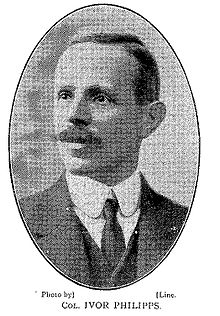Ivor Philipps
|
Major General Sir Ivor Philipps KCB, DSO |
|
|---|---|

Ivor Philipps, circa 1905
|
|
| Member of Parliament for Southampton | |
|
In office 12 January 1906 – 15 November 1922 Serving with William Dudley Ward |
|
| Preceded by | Sir John Simeon, 4th Baronet |
| Succeeded by | Edwin King Perkins |
| Personal details | |
| Born |
9 September 1861 Warminster, Wiltshire |
| Died | 15 August 1940 (aged 78) Vincent Square, London |
| Nationality | British |
| Political party | Liberal Party |
| Military service | |
| Allegiance | United Kingdom |
| Service/branch |
British Army British Indian Army |
| Years of service | 1881–1916 |
| Rank | Major General |
| Commands |
38th (Welsh) Infantry Division (1915–16) 115th Brigade (1914–15) Pembroke Yeomanry (1908–12) |
| Battles/wars |
Third Anglo-Burmese War North-West Frontier Tirah Campaign Boxer Rebellion First World War |
| Awards |
Knight Commander of the Order of the Bath Distinguished Service Order Mentioned in Despatches |
Major General Sir Ivor Philipps, KCB, DSO (9 September 1861 – 15 August 1940) was a British officer in the British Indian Army and a Liberal Party politician. He held a seat in the House of Commons from 1906 to 1922.
Philipps was the son of Rev. Sir J. E. Philipps, Bt. and his wife Mary Margaret, daughter of Rev. Samuel Best and sister of George Best, 5th Baron Wynford. His older brother John Philipps (1860–1938) was a Liberal Party politician who became Baron St Davids in 1908 and Viscount St Davids in 1918; his younger brothers include Lord Kylsant and Lord Milford.
Philipps was educated at Felsted School, and served in the British Army from 1881 to 1883.
Philipps joined the Indian Army in 1883 as a lieutenant, and was promoted to major in 1901. He fought in the Third Anglo-Burmese War from 1885 to 1889, in the Miranzai Expedition in 1891, the Isazai Expedition in 1892, with the Tirah Field Force from 1897 to 1898. He was appointed to a staff position at Indian army head quarters on 28 November 1899, as Deputy Assistant Quartermaster-General for Mobilization. With the outbreak of the Boxer Rebellion in China the following summer he was temporary attached to the China Field Force from June 1900, and served in China until 1901 as Quartermaster-General. He was awarded the Distinguished Service Order (DSO) in November 1900, in recognition of services during the Boxer Rebellion.
...
Wikipedia
